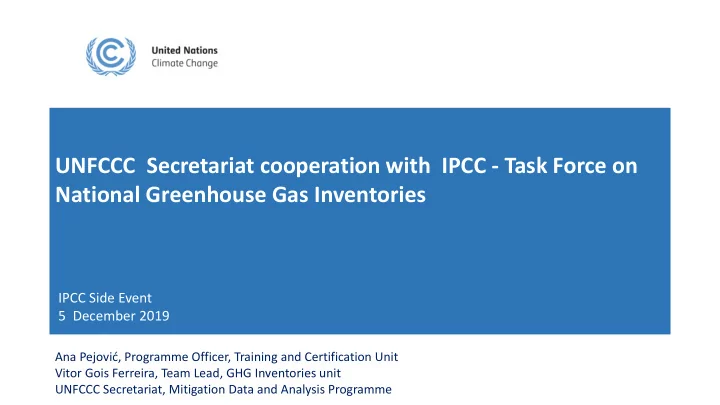

UNFCCC Secretariat cooperation with IPCC - Task Force on National Greenhouse Gas Inventories IPCC Side Event 5 December 2019 Ana Pejovi , Programme Officer, Training and Certification Unit ć Vitor Gois Ferreira, Team Lead, GHG Inventories unit UNFCCC Secretariat, Mitigation Data and Analysis Programme
Scope of the cooperation with IPCC TFI Regional training workshops on sustainable national greenhouse gas inventory management systems and the use of the 2006 IPCC Guidelines for National Greenhouse Gas Inventories Enhancement of the software - the completion of the IPCC Inventory Software according to guidance provided in the 2006 IPCC Guidelines IPCC Emission Factor Database 2019 Refinement to the 2006 IPCC Guidelines for National Greenhouse Gas Inventories
Regional training workshops on sustainable national greenhouse gas inventory management systems and the use of the 2006 IPCC Guidelines for National Greenhouse Gas Inventories At its forty-second session , the Subsidiary Body for Implementation noted the requests developing countries for further technical support aimed at improving their domestic capacity to facilitate continuity in meeting reporting requirements through training on the use of the Intergovernmental Panel on Climate Change 2006 IPCC Guidelines for National Greenhouse Gas Inventories and building sustainable national GHG inventory management systems , and understanding and applying best practices relevant to the setting up of domestic MRV systems.
Regional training workshops on sustainable national greenhouse gas inventory management systems and the use of the 2006 IPCC Guidelines for National Greenhouse Gas Inventories Three regional training workshops on sustainable national GHG inventory management systems and the use of the 2006 IPCC Guidelines for the following regions: • Africa, • Latin America and the Caribbean, and • Asia-Pacific and Eastern Europe .
Regional training workshops on sustainable national greenhouse gas inventory management systems and the use of the 2006 IPCC Guidelines for National Greenhouse Gas Inventories • Designed to cover the key role of a national GHG inventory management system including IA and the process of developing such a system, and • Use of the 2006 IPCC Guidelines in preparing national GHG inventories. • An interactive training approach is used, including presentations, discussions, exercises using realistic data sets and hands-on spreadsheets and software utilization; • Starting from this year - Uncertainty analysis using the IPCC Inventory Software and the @RISK tool; • Conducted by Members of the Technical Support Unit of the IPCC Task Force on National Greenhouse Gas Inventories,
Regional training workshops on sustainable national greenhouse gas inventory management systems and the use of the 2006 IPCC Guidelines for National Greenhouse Gas Inventories In 2018 and 2019 the workshops gather around 315 participants involved in GHG inventory management systems and addressed key elements required to ensure the sustainability of such systems as well as general guidance and reporting, sector-specific methodologies - the Energy, IPPU, AFOLU and Waste sectors and hands-on training on the IPCC inventory software .
Enhancement of the software - the completion of the IPCC Inventory Software according to guidance provided in the 2006 IPCC Guidelines The completion of the IPCC Inventory Software , so that any countries applying any of the methodological tiers and approaches contained in the 2006 IPCC Guidelines can potentially use it for its reporting obligations under the Paris Agreement, Article 13.7(a) as well as Decision 18/CMA.1 (paragraph 20 in its annex).
Enhancement of the software - the completion of the IPCC Inventory Software according to guidance provided in the 2006 IPCC Guidelines • Providing full support for Tier 2 calculation methods in IPPU sector ; • Extending reporting tables: • Implementing Summary reporting table to report for the whole time series in CO 2 -eq; • Export all reporting tables to XML format (background, sectoral, summary); • Extending handling of uncertainties ; • Extending key category analysis to Approach 2; • Extending Multilanguage support to all 6 UN languages ; • Extended support to users; • AFOLU Approach 3 capacity; • Time for development is 1 year.
IPCC Emission Factor Database The EFBD is referred to in the UNFCCC reporting guidelines on annual inventories for Annex I Parties . In particular, there is a explicit reference to this database in the reporting guidelines (para 12 in the annex of decision 24/CP.19) Parties could use EFs and parameters provided in the IPCC EFDB , where available. This, as provided they demonstrate these parameters are appropriate in the specific specific national circumstances and are more accurate than the default data provided in the 2006 IPCC Guidelines Regarding reviews of annual submissions, review experts have to consider the provision in the EF database when those are used in Parties’ submissions. In addition, EFs and parameters could be used in the adjustment process under the KP, as recommended international sources Experienced review officers from the UNFCCC secretariat attend meetings of the IPCC meeting database (last one in Osaka, Japan, EFDB 17), as members of the editorial board
2019 Refinement to the 2006 IPCC Guidelines for National Greenhouse Gas Inventories The UNFCCC secretariat’s GHG inventories review was invited to attend meetings for the elaboration of the 2019 Refinement to the 2006 IPCC Guidelines for national greenhouse gas inventories, including the scoping (Minsk, 2016) and lead author meetings (Victoria Falls, 2017, Cairns, 2018 and Rome, 2018). It also participated in the expert meetings (Geneva, São Paulo and Wollongong) for technical assessment of the IPCC Inventory Guidelines prior to the elaboration phase The Paris Agreement’s Modalities, procedures and guidelines (MPGs) for the transparency framework includes a reference to refinements to the 2006 Guidelines in para 20 of the annex to decision 18/CMA.1 “ Each Party shall use the 2006 IPCC Guidelines, and shall use any subsequent version or refinement of the IPCC guidelines agreed upon by the CMA ”
Thank you ! UNFCCC Secretariat, Mitigation Data and Analysis Programme
Recommend
More recommend